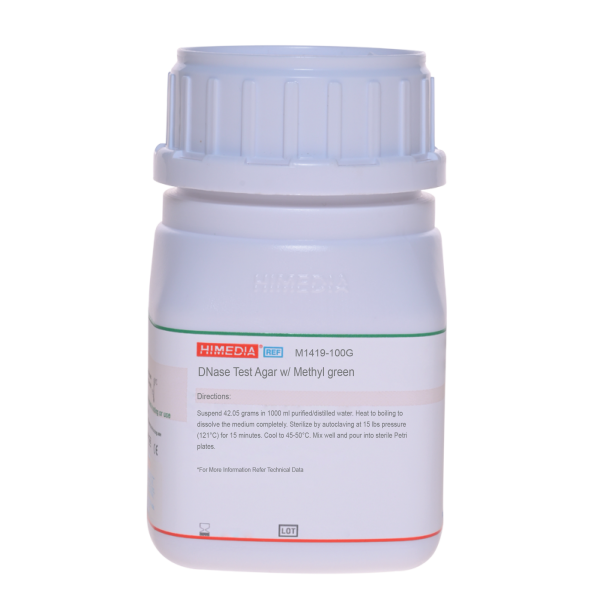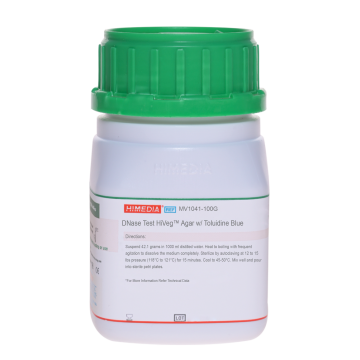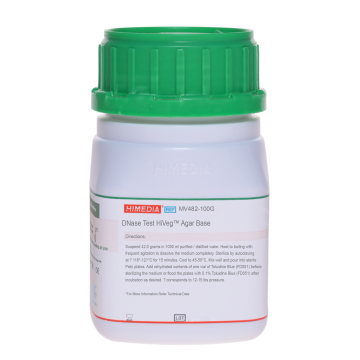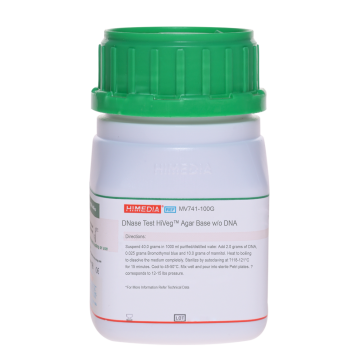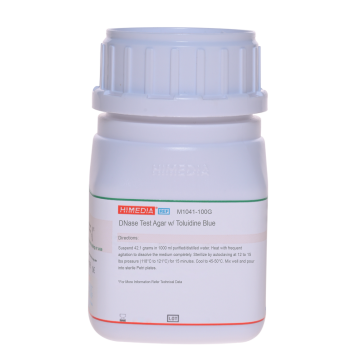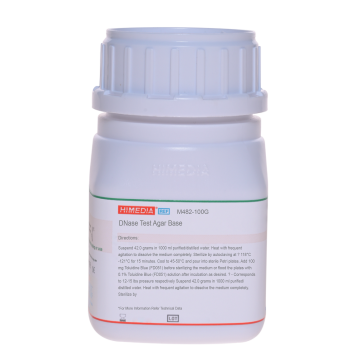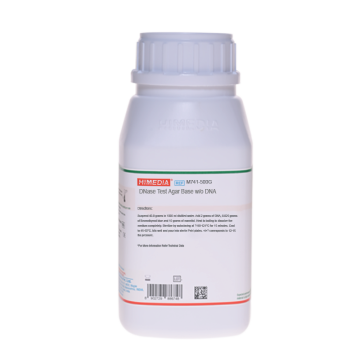 Your enquiry has been submitted
Your enquiry has been submitted
DNase Test Agar w/ Methyl Green
Intended Use
Recommended for detection of deoxyribonuclease activity of bacteria and fungi, and especially for identification of pathogenic Staphylococci from clinical samples.
Composition**
| Ingredients | g/L |
|---|---|
| Tryptose | 20.000 |
| Deoxyribonucleic acid (DNA) | 2.000 |
| Sodium chloride | 5.000 |
| Methyl green | 0.050 |
| Agar | 15.000 |
Final pH (at 25°C): 7.3±0.2
**Formula adjusted, standardized to suit performance parameters
Directions
Suspend 42.05 grams in 1000 ml purified/distilled water. Heat to boiling to dissolve the medium completely. Sterilize by autoclaving at 15 lbs pressure (121°C) for 15 minutes. Cool to 45-50°C. Mix well and pour into sterile Petri plates.
Principle And Interpretation
DNase test Agar is used for detecting deoxyribonuclease activity of bacteria and fungi and particularly for identification of pathogenic Staphylococci (1). DNase producing organisms exhibit clear zone around growth against green background. Reagent addition is not required (2). This medium is based on modification of the procedure for detecting DNase-producing bacteria as per Smith, Hanoch, and Rhoden (3) and Jefferies, Holtman and Guse (4). The medium supports growth of both gram positive and gram-negative bacteria.
Tryptose serves as nitrogenous source for the organisms. DNase produced by microorganisms depolymerizes the DNA substrate in the medium. Methyl green fades into a colourless compound producing distinct clear zones surrounding colonies (or band/spot inocula) in an otherwise green coloured medium. Methyl green requires a highly polymerized DNA substrate (5) and it combines with polymerized DNA forming a stable, green complex at pH 7.5 (6,7,8). As hydrolysis progresses, methyl green is released and when not combined at this pH it fades and becomes a colourless compound. Therefore clear zones are observed (7,9).
Type of specimen
Isolated Microorganism from clinical and non clinical samples
Specimen Collection and Handling:
For isolated microorganism samples, follow appropriate techniques for sample collection and processing as per guidelines (1,3). After use, contaminated materials must be sterilized by autoclaving before discarding.
Warning and Precautions
In Vitro Diagnostic use only. For professional use only. Read the label before opening the container. Wear protective gloves/protective clothing/eye protection/ face protection. Follow good microbiological lab practices while handling specimens and culture. Standard precautions as per established guidelines should be followed while handling clinical specimens. Safety guidelines may be referred in individual safety data sheets.
Limitations :
- The test organisms must be in pure culture and 18-24 hours old.
Performance and Evaluation
Performance of the medium is expected when used as per the direction on the label within the expiry period when stored at recommended temperature.
Quality Control
Appearance Light yellow to greeenish yellow homogeneous free flowing powder
Gelling Firm, comparable with 1.5% Agar gel
Colour and Clarity of prepared medium Green coloured, clear to slightly opalescent gel forms in Petri plates
Reaction Reaction of 4.2% w/v aqueous solution at 25°C. pH: 7.3±0.2
pH 7.10-7.50
Cultural Response
Cultural characteristics observed after an incubation at 35-37°C for 18-24 hours
| Organism | Growth | DNase Activity |
|---|---|---|
| Serratia marcescens ATCC 8100 | luxuriant | positive, clear halo around the growth. |
| Staphylococcus aureus subsp. aureus ATCC 25923 (00034*) | luxuriant | positive, clear halo around the growth. |
| Staphylococcus epidermidis ATCC 12228 (00036*) | luxuriant | negative reaction |
| Streptococcus pyogenes ATCC 19615 | luxuriant | positive, clear halo around the growth. |
Key: *Corresponding WDCM numbers.
Storage and Shelf Life
Store between 10-30°C in a tightly closed container and the prepared medium at 2-8°C. Use before expiry date on the label. On opening, product should be properly stored dry, after tightly capping the bottle in order to prevent lump formation due to the hygroscopic nature of the product. Improper storage of the product may lead to lump formation. Store in dry ventilated area protected from extremes of temperature and sources of ignition. Seal the container tightly after use. Product performance is best if used within stated expiry period.
Disposal
User must ensure safe disposal by autoclaving and/or incineration of used or unusable preparations of this product. Follow established laboratory procedures in disposing of infectious materials and material that comes into contact with clinical sample must be decontaminated and disposed of in accordance with current laboratory techniques (10,11).
Reference
- Macfaddin, J. F., 1985, Media for Isolation-Cultivation-Identification-Maintenance of Medical Bacteria, Volumel Williams, Wilkins, Baltimore.
- Schreier 1969. Am. J. Clin. Pathol. 51:711.
- Jeffries C.D.; Holtman, D.F.; and Guse, D.G (1957) J. Bacteriol., 73, 590.
- Smith, P.B., Hancock, G. A., and Rhoden, D. L (1969) Appl. Microbiol., 18,991.
- Lachica, R.V.F. and Deibel, R. H (1969). Appl. Environ, Microbiol., 32 (4), 633.
- Kurnick, N.B (1947). Cold Spring Harbor Symp. Quant. Biol., 12, 141.
- Kurnick, N.B (1950) Arch. Biochem., 29, 41.
- Kurnick, N.B and Foster, M. (1950) J. Gen. Microbiol. 33. 243.
- Kurnick, N.B and Foster, M. (1950) J. Gen. Physiol. 34, 147.
- Isenberg, H.D. Clinical Microbiology Procedures Handbook 2nd Edition.
- Jorgensen, J.H., Pfaller, M.A., Carroll, K.C., Funke, G., Landry, M.L., Richter, S.S and Warnock., D.W. (2015) Manual of Clinical Microbiology, 11th Edition. Vol. 1.
| Product Name | DNase Test Agar w/ Methyl Green |
|---|---|
| SKU | M1419 |
| Product Type | Regular |
| Physical Form | Powder |
| Origin | Animal |
| Packaging type | HDPE |
| References | 1. Macfaddin, J. F., 1985, Media for Isolation-Cultivation-Identification-Maintenance of Medical Bacteria, Volume1 Williams,Wilkins, Baltimore. |
| Customized Product Available | No |



